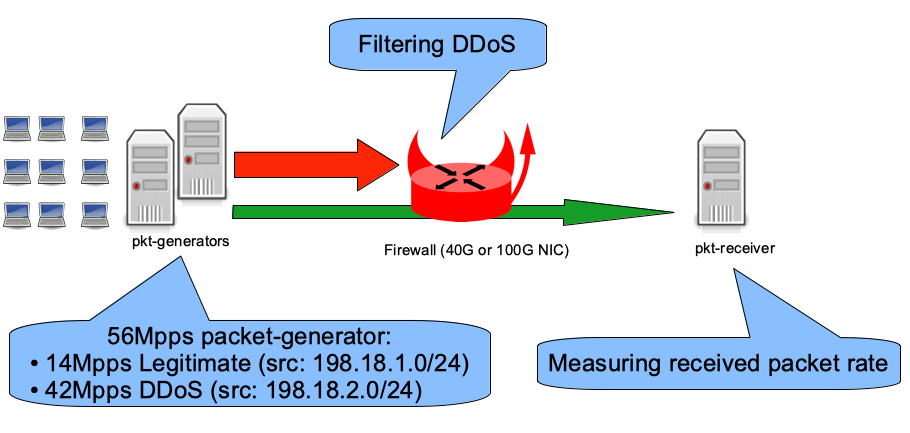- en
- fr
This is an old revision of the document!
Table of Contents
Dropping packets at high rate
Goal
Using IPFW
Standard IP level configuration
The configuration file of an IPFW in standard mode is this one:
- First rule is a blacklist of denied IP addresses
- Second rule is to allow all the rest
- Disabling the outgoing pfil(9) hook because we don't need to filter outgoing traffic
#!/bin/sh
set -eu
fwcmd="/sbin/ipfw"
${fwcmd} -f flush
${fwcmd} table blacklist destroy || true
${fwcmd} table blacklist create type addr
${fwcmd} table blacklist add 198.18.2.0/24
${fwcmd} add deny udp from table\(blacklist\) to any
${fwcmd} add pass ip from any to any
pfilctl unlink -o ipfw:default inet || true
pfilctl unlink -o ipfw:default6 inet6 || true
NIC level configuration
(A FreeBSD 13 / head) only feature.
Only iflib, vtnet, Mellanox and Chelsio drivers are “Pfil Memory Pointer Hooks” compliant.
The configuration file of an IPFW-at-NIC-level is this one:
- First rule is a blacklist of denied IP addresses
- Second rule is to allow all the rest
- Removing pfil(9) from the IP level (in & out)
- Enabling pfil(9) at NIC level (in only)
#!/bin/sh
set -eu
fwcmd="/sbin/ipfw"
${fwcmd} -f flush
${fwcmd} table blacklist destroy || true
${fwcmd} table blacklist create type addr
${fwcmd} table blacklist add 198.18.2.0/24
${fwcmd} add deny udp from table\(blacklist\) to any
${fwcmd} add pass ip from any to any
if pfilctl link -i ipfw:default-link cxl0; then
pfilctl unlink -i ipfw:default inet || true
pfilctl unlink -o ipfw:default inet || true
pfilctl unlink -i ipfw:default6 inet6 || true
pfilctl unlink -o ipfw:default6 inet6 || true
fi
Performance impact
Here is the rate of inet4 packets-per-second forwarded while dropping the 42Mpps of DDoS using the different configuration sets:
x ipfw-standard
+ ipfw-at-nic-level
+--------------------------------------------------------------------------+
| +|
| +|
| +|
| x +|
|xx xx +|
||MA| |
| A|
+--------------------------------------------------------------------------+
N Min Max Median Avg Stddev
x 5 9902014.5 10004945 9940500.5 9949589.9 41823.097
+ 5 12013847 12018302 12015790 12015667 1720.41
Difference at 95.0% confidence
2.06608e+06 +/- 43167.6
20.7655% +/- 0.523817%
(Student's t, pooled s = 29598.4)
Using Chelsio's TCAM firewall
Chelsio NIC allows to configure hardware firewall with the use of cxgbetool(8). A Chelsio NIC is defined by its family name + id and the port id (if it's a 4 ports, port 0 to 4). Example with only one Chelsio (t5nex0) with 2 ports (0 and 1)
# grep t5nex /var/run/dmesg.boot t5nex0: <Chelsio T580-LP-CR> mem 0xf9300000-0xf937ffff,0xf8000000-0xf8ffffff,0xf9984000-0xf9985fff irq 40 at device 0.4 on pci4 cxl0: <port 0> on t5nex0 cxl1: <port 1> on t5nex0 t5nex0: PCIe gen3 x8, 2 ports, 66 MSI-X interrupts, 130 eq, 65 iq
Here is the same rules translated for this usage:
- cxl0 is then port 0 of t5nex0
- Add a filter to drop packets incoming from port 0 matching source IP range 198.18.2.0/24
# cxgbetool t5nex0 filter 0 iport 0 sip 198.18.2.0/24 action drop # cxgbetool t5nex0 filter list Idx Hits FCoE Port vld:VLAN Prot MPS Frag DIP SIP DPORT SPORT Action 0 0 0/0 0/7 0:0000/0:0000 00/00 0/0 0/0 00000000/00000000 c6120200/ffffff00 0000/0000 0000/0000 Drop
Checking the drop rate now by using a small script:
#!/bin/sh
set -euf -o pipefail
if [ $# -eq 0 ]; then
echo "Need Chelsio nexus name (examble: t5nex0)"
echo "List of Nexus detected:"
grep t5nex /var/run/dmesg.boot || true
exit 1
fi
VALUE=$(cxgbetool $1 filter list | awk '{if (NR!=1) {print $2}}')
echo "Filter hit rate"
while true; do
sleep 1
NEW_VALUE=$(cxgbetool $1 filter list | awk '{if (NR!=1) {print $2}}')
RATE=$((NEW_VALUE - VALUE))
VALUE=${NEW_VALUE}
echo ${RATE}
done
And its output during the 42Mpps DDoS:
# /tmp/cxgbe-filter-rate.sh t5nex0 32361520 32365722 32368802 32492850 32494303 32434792 32398556
The NIC is filtering at a rate of 32Mpps: Where are the 10Mpps missing?
Need to tune the TCAM for a filtering usage:
- Let only 2 occupied “regions” in the TCAM: route and filter
Here the default value:
# sysctl -n dev.t5nex.0.misc.devlog | grep -w le
12 576921 INFO RES le configuration: nentries 2048 route 32 clip 32 filter 1440 server 416 active 128 hash 0 nserversram 0
16 619796 INFO RES le initialization: nentries 2048 route 32 clip 32 filter 1440 server 416 active 128 hash 0 nserversram 0
For that we need to download a default TCAM firmware configuration file for our T5 NIC to edit its parameters and load it into the NIC
# fetch -o /etc/t5fw.txt 'https://svnweb.freebsd.org/base/head/sys/dev/cxgbe/firmware/t5fw_cfg_hashfilter.txt?view=co' # sed -i "" -e "s/nclip.*/nclip = 0/" /etc/t5fw.txt # sed -i "" -e "s/nfilter.*/nfilter = 2000/" /etc/t5fw.txt # sed -i "" -e "s/nserver.*/nserver = 0/" /etc/t5fw.txt # sed -i "" -e "s/nhash.*/nhash = 0/" /etc/t5fw.txt # echo 'hw.cxgbe.config_file="flash"' >> /boot/loader.conf.local # cxgbetool t5nex0 loadcfg /etc/t5fw.txt
Check the new tuned parameters:
# sysctl -n dev.t5nex.0.misc.devlog | grep -w le
12 690716 INFO RES le configuration: nentries 2048 route 32 clip 32 filter 1024 server 0 active 960 hash 0 nserversram 0
We confirm that server|hash are at 0,
Now the packet drop rate by the TCAM firewall match the generator's 42Mpps:
# /tmp/cxgbe-filter-rate.sh t5nex0 42218564 42147194 42229442 42171263 42210128 42165602 42165483 42223090
And the firewall able to forward all packets without being too busy in the same time:
[root@firewall]~# netstat -ihw 1
input (Total) output
packets errs idrops bytes packets errs bytes colls
46M 0 5.0k 2.7G 14M 0 801M 0
46M 0 2.6k 2.7G 14M 0 801M 0
46M 0 2.1k 2.8G 14M 0 801M 0
45M 0 515 2.7G 14M 0 801M 0
46M 0 1.7k 2.7G 14M 0 801M 0
46M 0 422 2.7G 14M 0 801M 0
46M 0 3.9k 2.7G 14M 0 801M 0
[root@firewall]~# nstat -I cxl0
InMpps OMpps InGbs OGbs err TCP Est %CPU syscalls csw irq GBfree
45.60 0.00 23.35 0.00 1553 1 67.15 393 3168947 1728658 123.75
45.56 0.00 23.33 0.00 4497 1 66.87 398 3171213 1729358 123.75
45.53 0.00 23.31 0.00 12418 1 66.76 372 3182570 1734057 123.75
45.52 0.00 23.31 0.00 9215 1 65.43 371 3183916 1735372 123.75

